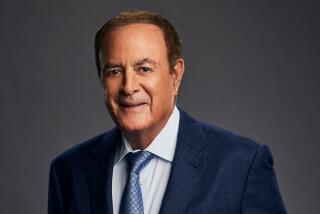Taking a Shot on Goal
- Share via
Cammi Granato looked like any of the other beat reporters covering the Los Angeles Kings. After a team practice several weeks ago at Iceoplex in North Hills, she was spotted intently taking notes as Kings coach Larry Robinson talked about his club to a group of sportswriters.
Just last winter, it was Granato who was the object of countless press inquiries when she led the U.S. women’s hockey team to a gold medal at the Olympic Games in Nagano, Japan. Now, it’s the 27-year-old hockey heroine who finds herself asking many of the questions as the Kings’ new radio color commentator.
The native of Downers Grove, Ill., arrived in Los Angeles this fall with plenty of hockey knowledge but zero professional broadcasting experience. So far, her on-the-job training has consisted of doing commentary for nine exhibition and 11 regular-season Kings games on KRLA-AM (1110).
It’s not easy learning the craft of radio sports analysis at the major-league level, a point she’s more than willing to acknowledge.
“It’s a very big challenge, but it’s an enjoyable one,” says Granato. “There’s going to be a period of learning. So there’s definitely room to sound inexperienced because you don’t have it yet. You just have to give that whole pride thing up. You have to challenge yourself and try to get better every game.”
Because of the speed of the game and relatively brief stoppages of play, hockey may be the most difficult of the four major sports to broadcast. Granato credits her partner, Nick Nickson, the Kings’ radio play-by-play announcer, for helping her with her on-air timing. She says he sometimes uses hand signals as a way of integrating her more smoothly into the broadcasts.
“She’s getting to be a lot more comfortable in terms of when and how to get in and out during the play and during stoppages,” observes Nickson, a color and play-by-play man with the Kings for the last 17 years. “Hockey is the fastest sport out there, and there is a tendency to feel you’re rushed. So there is always the feeling like, ‘I’ve got something to say and I don’t have much time to say it.’ If you’ve never had experience, that can be overwhelming. To be honest, I’m quite surprised and pleased how much progress she has made in such a short time.”
The former Providence College hockey star is the only woman broadcaster working in the 27-team National Hockey League. She is also only the second woman to ever occupy such a position in the league. Sherry Ross was the New Jersey Devils’ radio commentator between 1992 and ’95.
Granato is used to being a pioneer. When she was a youngster, there weren’t many females competing in the male-dominated world of hockey. Today, there are more than 23,000 women and girls participating in programs under the auspices of USA Hockey, the governing body of amateur hockey.
Now Granato feels privileged to be a trailblazer in the hockey broadcasting booth as well.
“I don’t feel burdened” as the only woman broadcaster in the NHL, she says. “I feel really honored to be given that opportunity to break that barrier, knowing that other women might say, ‘Hey, this is what I want to do too.’ I have the support of so many women [as a hockey player and broadcaster]. It’s awesome. All women who have tried to accomplish things in life have had to break some barrier down.”
For the Kings, Granato’s attraction is based at least partly on her status as the most recognizable and prominent figure in women’s hockey. In 1996, she won the USA Women’s Hockey Player of the Year award. She also has endorsement deals with AT&T;, Nike and Chevrolet. The Kings are hoping that Granato will help expand local interest in hockey, particularly amongwomen. Besides her on-air duties, she plays a key part in the team’s marketing efforts. On Saturday afternoon, she conducted a hockey clinic for women at the Santa Monica Pier. The seminar was part of a two-day event called NHL Breakout Weekend, which also featured several Kings players.
When the Kings hired Granato in September, team President Tim Leiweke said she would bring a “unique perspective to the game” as a woman color commentator. But Nickson believes that one’s sex shouldn’t make a difference when calling or analyzing a game from the broadcast booth.
“A female fan came up to her at a game in San Jose and said, ‘I listen to the Kings’ games on the Internet because I want to know what a woman’s perspective of the sport is,’ ” recalls Nickson. “I kind of laughed because I wouldn’t know what a woman’s perspective of hockey would be. If a defenseman turns the puck over and the opposition scores, how is a woman’s perspective of that play different? Like, what’s the woman’s perspective, “Well, that was a cute turnover’? “
Granato’s job with the Kings does not signal the end of her career as a hockey player. She agreed to take the job only so long as she could continue playing. She is vying for a spot on the 1999 U.S. women’s national team. Her first season with the Kings will be interrupted twice because of commitments to the squad. After Kings practices, Granato often skates with the team’s coaches or by herself. She also adheres to a five-day-a-week, off-the-ice workout regimen.
Granato says Robinson--who besides being the Kings’ coach is a Hockey Hall of Fame defensemen who won six Stanley Cups with the Montreal Canadiens--has proved valuable in more ways than one.
“He’s not only available when I need to talk to him about the team and to get quotes from, but he’s also helped me with my hockey,” she says. “Getting tips from Larry Robinson is something that means a lot to me. That’s been an extra bonus.”
At this point, the plan is for Granato to work as the Kings’ radio analyst for three seasons, which would lead her right up to her likely commitment to the U.S. Olympic team. She says it’s hard to tell just how she will feel about her broadcasting career in four or five years. “Right now [developing my skills as a radio sports commentator] is my goal,” Granato says. “I’m using this as an amazing experience to gain some knowledge and to improve myself. I can’t say where I’ll be in the future because I don’t know how good I am yet and I don’t know how good I will become. I understand that a lot of people feel this way when they first get into it. I’m just in the early stages, so I’m not trying to map out this huge plan.”
More to Read
Go beyond the scoreboard
Get the latest on L.A.'s teams in the daily Sports Report newsletter.
You may occasionally receive promotional content from the Los Angeles Times.






